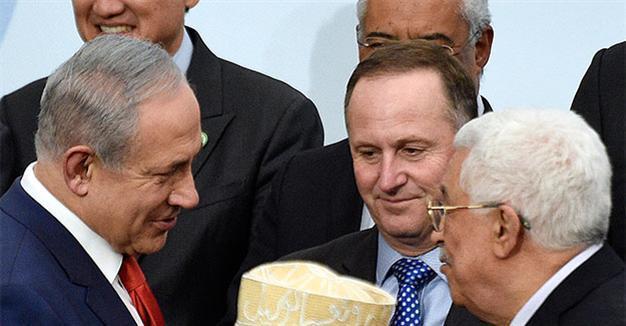Russia: Israel, Palestinian leaders agree to meet for talks
MOSCOW – The Associated Press

In this Nov. 30, 2015 file photo, Israeli Prime Minister Benjamin Netanyahu, left, talks with Palestinian President Mahmoud Abbas, right, at the COP21, the United Nations Climate Change Conference, in Le Bourget, outside Paris. AP photo
Russian Foreign Ministry announced on Sept. 8 that Israeli and Palestinian leaders have agreed “in principle” to meet in Moscow for talks in what the Russians hope will relaunch Mideast peace talks after a more than a two-year break.
According to ministry spokeswoman Maria Zakharova, Moscow has heard from the offices of Palestinian President Mahmoud Abbas and Israeli Prime Minister Benjamin Netanyahu that the two agreed to meet in the Russian capital, though it was not clear when that will happen.
“The most important thing is to pick the right timing,” Zakharova told reporters. “Intensive contacts on this are ongoing.”
The comments indicated that Russia is pushing forward with its efforts to host the meeting. Abbas said this week that a meeting scheduled in Moscow had been postponed at Israel’s request. Abbas and Netanyahu exchanged a brief handshake last year at a global climate change conference in Paris but have not held a public working meeting since 2010.
The key stumbling block to the meeting is the agenda.
Abbas has said that he would only meet Netanyahu if Israel freezes settlement construction on occupied lands claimed by the Palestinians and carries out a previously agreed-on release of Palestinian prisoners. Netanyahu has rejected the terms and said a meeting should take place without conditions.
Any meeting between the two men would represent a breakthrough of sorts. The last round of peace U.S.-brokered peace talks broke down nearly two-and-a-half years ago without any progress. But with Abbas and Netanyahu at odds on nearly every major issue between them, chances for substantial progress would seem slim.
If a meeting were to take place, it would reflect the growing Russian influence in the Middle East. The Russian military has sent fighter jets to Syria to back Syrian President Bashar al-Assad in his battle against various rebel groups. Israel, while largely staying out of the war, maintains close contact with the Russians to avoid any clashes between the two countries’ air forces.
